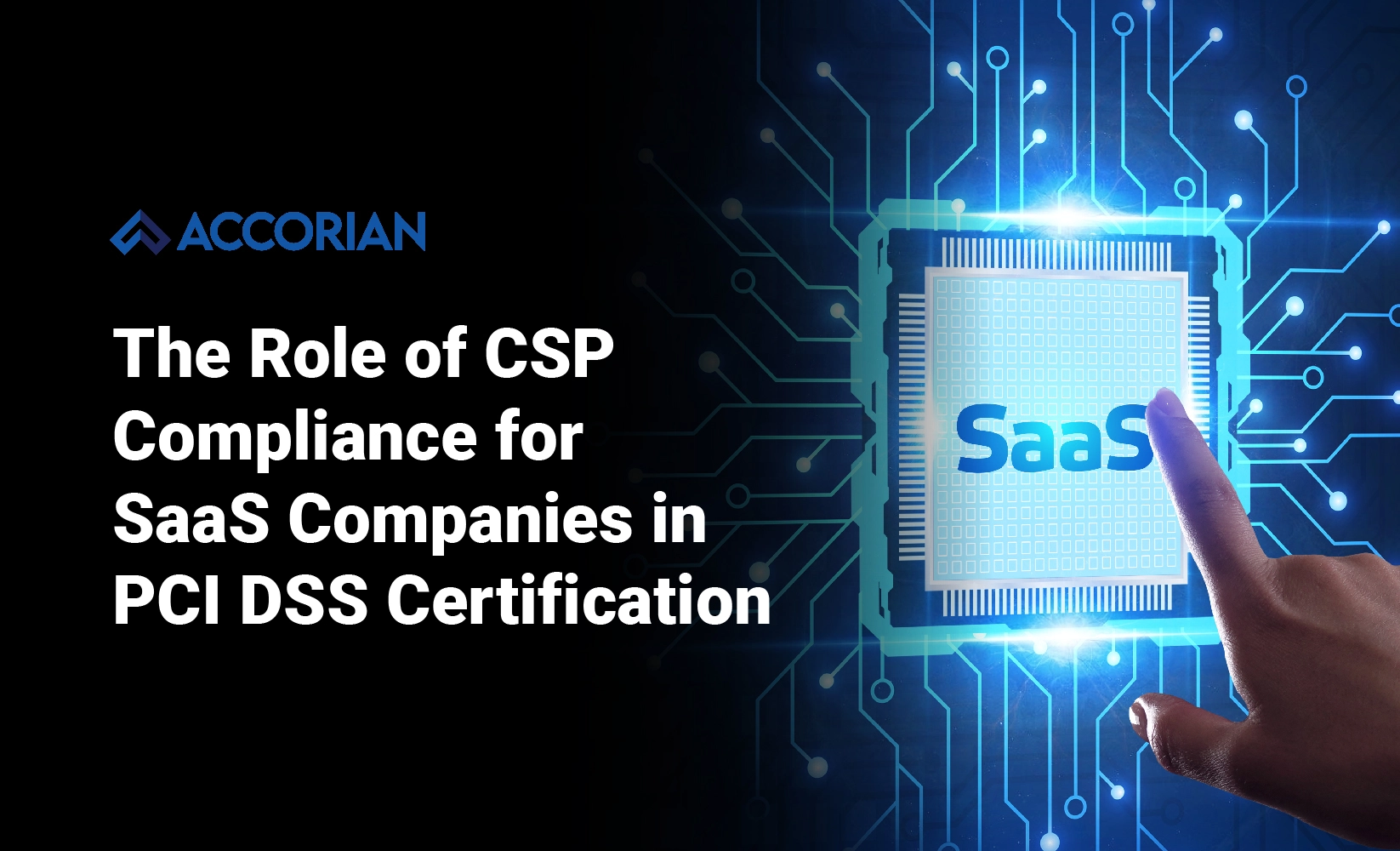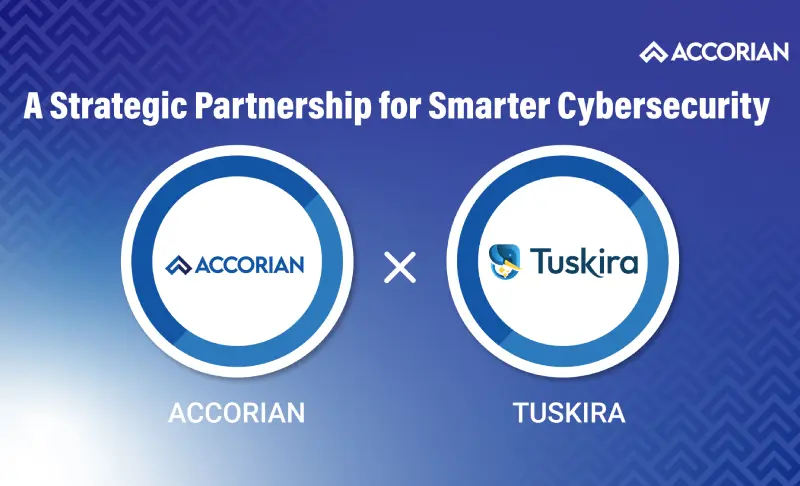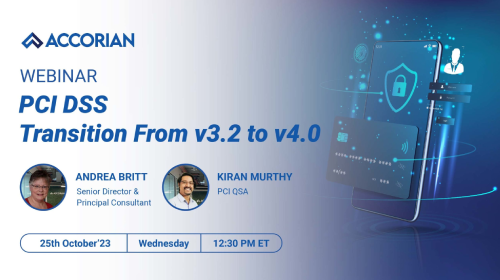PCI DSS
Data breaches usually cost an average of $4.35 million, highlighting the critical need for organizations to adopt PCI DSS – a global framework for securing payment, card transactions, and cardholder data, managed by the PCI Security Standards Council (PCI SSC).
The Payment Card Industry Data Security Standard (PCI DSS) is a key framework that not only secures payment card transactions but also protects cardholders’ data. Managed by the Payment Card Industry Security Standards Council (PCI SSC), it outlines policies designed to reduce cybersecurity risks and fraud. Moreover, compliance is essential for any organization that processes, stores, or transmits payment card information.
Accorian is PCI QSA
Our certified QSAs play a pivotal role in safeguarding cardholder data. Through on-site and remote assessments of security controls, we not only evaluate compliance but also provide valuable insights and recommendations for improvement. Additionally, we support the development and implementation of essential security policies and procedures.
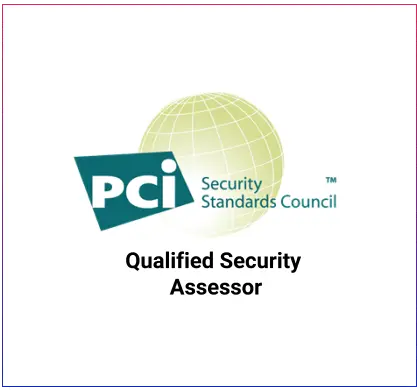
Accorian is PCI ASV
As an ASV, we conduct comprehensive vulnerability assessments and penetration testing, helping organizations not only identify risks but also fortify their security measures. In doing so, we meticulously define the scope of PCI compliance by evaluating critical components like firewalls, routers, and switches. Furthermore, this assessment identifies programs, subnets, and network segments responsible for handling cardholder data.
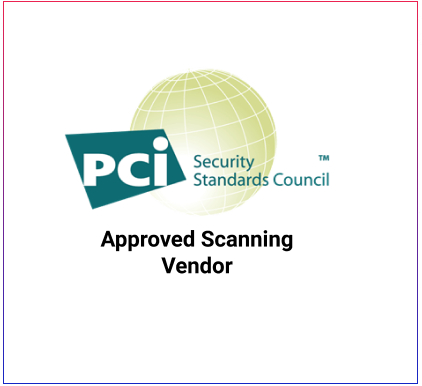
PCI DSS Transition From v3.2 to v4
In March 2022, the Payment Card Industry Security Standards Council unveiled the latest iteration of PCI DSS, marking a significant transition from v3.2 to v4.0. This update provides a more defined vision of the future payment security landscape.
Four key motivations to drive the revision…
Ensuring the ongoing alignment of the standard with the evolving security demands of the payments industry
Fostering the idea of security as a continuous dynamic process
Enhancing the methods and procedures for validation
Expanding the framework's flexibility and strategies to achieve robust security in the payment card industry
PCI DSS Requirements Whitepaper - The Extensive Guide
Our 23-page PCI DSS white paper provides a detailed and digestible explanation of each requirement. Save hours of research and confusion with one resource built to help your organization stay secure and audit-ready.
Access Our All-In-One PCI DSS Brochure
Accorian’s PCI DSS Methodology
Scoping Assessment
Determine the applicable scope, with or without the inheritance of controls and card flow.
Readiness/Gap Assessment
Assist in understanding your current readiness concerning PCI DSS compliance.
vSecurity Team Support
Streamline PCI DSS requirements by providing remediation guidance, aiding in evidence collection, providing program management, and augmenting your team to assist in remediation efforts.
Policy & Procedure Development
Assist in developing or updating your security framework and policies.
PCI ASV Scanning
Conduct the mandatory quarterly PCI Approved Scanning Vendor (ASV) network scans.
Pre-Audit
Conduct a readiness audit to ascertain that you meet the PCI requirements.
Assisted SAQ Filling
Help complete and submit your Self-Assessment Questionnaire (SAQ).
PCI Audit & ROC
Perform a final audit with reporting conducted by our Qualified Security Assessor (QSA).
Applicability of PCI DSS
PCI standards have a broader impact on the payment card industry as they encompass all companies that handle credit card transactions and have access to cardholder data (CHD) or sensitive authentication data (SAD). Moreover, this standard also extends to service provider companies involved in credit card processing, whether directly or indirectly.
Therefore, payment card industry compliance serves as a benchmarking security standard for various organizations, regardless of their size, transaction volume, or how they collect information (directly or indirectly).
Directly accept credit card/account information
Indirectly accept credit card/account information
Service Providers/Vendors to companies who directly/indirectly take credit card/account information
What Data Does PCI DSS Impact?
Cardholder Data includes information required for transaction processing, while Sensitive Authentication Data refers to sensitive details used for authentication, such as PINs or CVVs. While Cardholder Data can be stored if encrypted, Sensitive Authentication Data, on the other hand, must never be stored after authorization to effectively minimize the risk of fraud.
Card Holder Data & Sensitive Authentication Data
- Primary Account Number (PAN)
- Cardholder Name
- Expiration Date
- Service Code
Sensitive Authentication Data Includes
- Full Track Data
- Card Verification Code
- PINs/PIN Blocks
PCI DSS Requirements & Controls
Source Link: https://www.pcisecuritystandards.org/
PCI DSS Merchant Level Classification
The PCI DSS categorizes companies into four merchant levels based on the volume of transactions they process yearly.
The 4 Levels of PCI Compliance
- 6m+ transactions/year
- 1-6m+ transactions/year
- 20k-1m transactions/year
- <20k transactions/year
Choosing The Right PCI DSS SAQ
| SAQ Type | Description | Total Requirements | Total Controls |
|---|---|---|---|
| A |
Card-not-present merchants (e-commerce or mail/telephone-order) that completely outsource all account data functions to PCI DSS validated and compliant third parties. No electronic storage, processing, or transmission of account data on their systems or premises. Not applicable to face-to-face channels. Not applicable to service providers. |
7 | 27 |
| A-EP |
E-commerce merchants that partially outsource payment processing to PCI DSS validated and compliant third parties, and with a website(s) that does not itself receive account data, but which does affect the security of the payment transaction and/or the integrity of the page that accepts the customer’s account data. No electronic storage, processing, or transmission of account data on the merchant’s systems or premises. Applicable only to e-commerce channels. Not applicable to service providers. |
11 | 77 |
| B |
Merchants using only: • Imprint machines with no electronic account data storage, and/or • Standalone, dial-out terminals with no electronic account data storage. Not applicable to e-commerce channels. Not applicable to service providers. |
4 | 15 |
| B-IP |
Merchants using only standalone, PCI-listed approved PIN Transaction Security (PTS) point-of-interaction (POI) devices with an IP connection to the payment processor. No electronic account data storage. Not applicable to e-commerce channels. Not applicable to service providers. |
9 | 61 |
| C-VT |
Merchants that manually enter payment account data a single transaction at a time via a keyboard into a PCI DSS validated and compliant third-party virtual payment terminal solution, with an isolated computing device and a securely connected web browser. No electronic account data storage. Not applicable to e-commerce channels. Not applicable to service providers. |
6 | 34 |
| C |
Merchants with payment application systems connected to the Internet, no electronic account data storage. Not applicable to e-commerce channels. Not applicable to service providers. |
11 | 66 |
| P2PE |
Merchants using only a validated, PCI-listed Point-to-Point Encryption (P2PE) solution. No access to clear-text account data and no electronic account data storage. Not applicable to e-commerce channels. Not applicable to service providers. |
20 | 35 |
| SPoC |
Merchants using a commercial off-the-shelf mobile device with a secure card reader included on PCI SSC’s list of validated SPoC Solutions. No access to clear-text account data and no electronic account data storage. Not applicable to unattended card-present, mail-order/telephone order (MOTO), or e-commerce channels. Not applicable to e-commerce channels. Not applicable to service providers. |
19 | 111 |
| D |
SAQ D for Merchants: All merchants not included in descriptions for the above SAQ types. Not applicable to service providers. |
12 | 329 |
| D | SAQ D for Service Providers: All service providers defined by a payment brand as eligible to complete an SAQ. | 12 | 370 |
Source Link: https://www.pcisecuritystandards.org/
Why Choose Accorian?
Accorian holds the prestigious distinction of having a team of highly Qualified PCI QSAs (Qualified Security Assessors) who specialize in assessing PCI compliance, with a particular emphasis on network infrastructure. In addition, we are CREST-accredited and an ASV (Approved Scan Vendor). These PCI accreditations underline our expertise and credibility in cybersecurity and PCI DSS compliance.
Furthermore, our potential client industry includes sectors such as banking, financial services, credit unions, eCommerce, and SaaS, all of which must adhere to payment card industry DSS requirements.
Penetration testing isn't just about finding vulnerabilities; it's about empowering organizations to fortify their defenses against evolving cyber threats. Through meticulous analysis and simulated attacks, we uncover weaknesses before malicious actors do, ensuring your digital assets remain resilient in the face of adversity.



